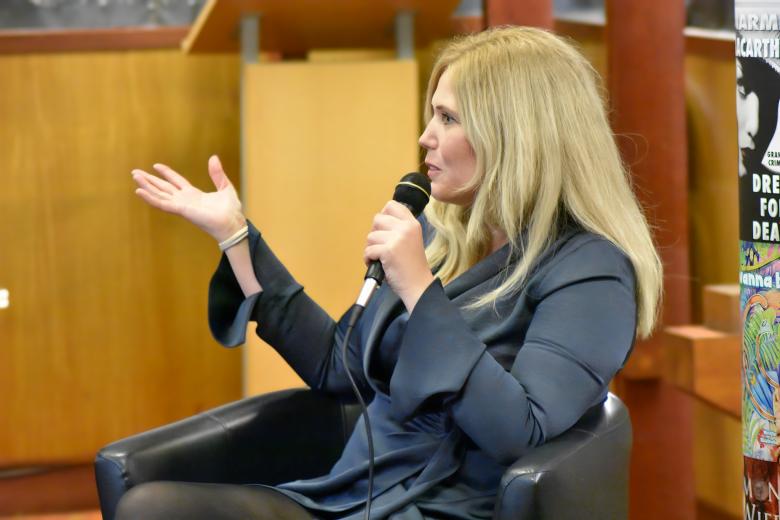Alumna Angela Stoof: The gentle strength of perspective
In the series From 'Alumnus to Author', we shine a spotlight on UM alumni who share their knowledge and experiences through books. This time, we focus on Angela Stoof, who published her book Perspectief in 2024. With this book, she hopes to offer people hope and perspective in a world full of change, while also reintroducing kindness and humanity into conversations.
The very first psychology student at UM
When Angela was browsing an education fair in 1994, waiting patiently for her friends, her eye was caught by a stand promoting the Cognitive Psychology course at Maastricht University. Initially, she had walked past it without a second glance, but it turned out to be the perfect match for this young student. Psychology was a brand-new programme for the university and would be launching for the first time the following year. That appealed to Angela: a course without rigid structures, where she could actively contribute to shaping the curriculum.
And so, in 1995, Angela embarked on her journey at Maastricht University. Armed with her English-language textbooks in one hand and an English-Dutch dictionary in the other, she threw herself wholeheartedly into her studies. She became one of the first psychology graduates in 1999. In fact, she had the honour of being the very first psychology alumna to receive her degree from the university.
As a pioneer on the course, Angela was part of the programme committee, contributing to the development of the curriculum. But even beyond the committee, there was ample space to provide feedback. She recalls: “All the lecturers knew you, simply because you were part of the very first cohort. So it was easy to give feedback and make your voice heard. It was a truly unique situation.”
The Cognitive Psychology course at Maastricht University was offered within a Problem-Based Learning (PBL) system, and Angela looks back on that with great appreciation. “I actually sailed through the programme, and I really think that was thanks to the PBL system. It encouraged me to ask questions and to explore.” She especially valued the space to examine cases from multiple angles. “I always really enjoyed playing with different perspectives. I think that way of thinking was definitely encouraged there,” Angela reflects.
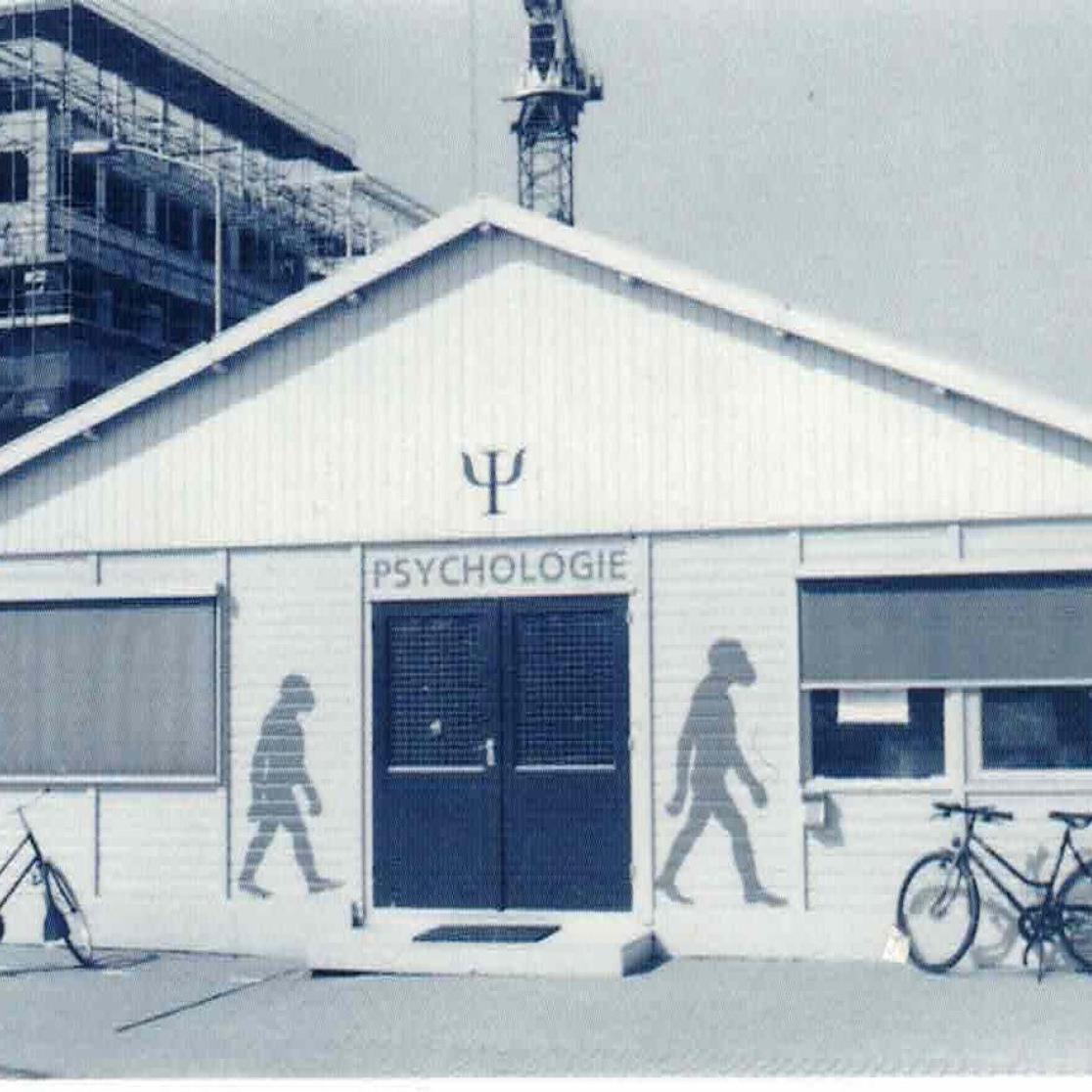
From analytical to emotional
After graduating smoothly, Angela decided to pursue doctoral research at the Open University in Heerlen, focusing on competence-based education. It was largely quantitative research, with a strong emphasis on statistics. “Along the way, I noticed: ‘something’s missing’. Something started to gnaw at me, but I found it very hard to pinpoint. I also had a burnout in between – I hit a wall.” While the PBL system at UM had offered her room to explore, during her PhD she felt increasingly boxed in. “I also struggled with being cast in the role of an objective researcher. That kind of distance from your subject felt unnatural. And the academic conferences I attended felt alienating. I felt like we were asking the wrong questions and that our type of research was squeezing the life out of things. I was searching for something else, but I didn’t know what.”
She successfully defended her PhD in 2005, but immediately made a bold decision: she would never do research again. Only years later did Angela realise that her natural approach as a researcher aligned far more closely with other philosophical traditions of science, such as phenomenology and hermeneutics. “The position I had as a PhD student didn’t really suit me as a person. But it took me years to realise that.”
I’m never doing research again. I had become deeply disillusioned with academia.
After completing her doctorate, Angela took a completely new direction. She was looking for something beyond the analytical, scientific lens – something that allowed space for the voice of the heart, for feelings and emotions. In 2007, she founded her own business: Kimi’mila. The name, derived from a Native American myth, means "butterfly" and symbolises transformation and transition – a perfect match for her new work: guiding people through grief and farewells. “I wrote farewell texts for people who had passed away and helped to shape the farewell service.”
In this role, Angela worked closely with vulnerable individuals, which demanded a completely different approach from her academic background. “As a scientist, you’re trained to work from your head. You learn to analyse and think critically. But when working with vulnerable people, something else is needed. As a ritual guide, I felt I was working from my heart and gut. It was beautiful work, full of connection and humanity.”
A systemic problem
Through her work with funerals, her focus shifted from psychology to meaning-making and spirituality. This did not go unnoticed. In 2010, Angela was offered a role as a researcher at the Theology and Worldview Studies department at Windesheim University of Applied Sciences in Zwolle. “It was quite a surprising step, considering I’d previously sworn off academic research. But I had seen such fascinating things around grief and farewells, and I found myself asking questions again – analytical questions, the questions of a researcher. What happens during loss and mourning? Where do meaning, comfort, and resonant words come from? I think that was when I was ready to reunite head and heart.”
In this new role, she learned to look through a completely different human lens: not that of cognitive psychology, but of theology. “In cognitive psychology, humans are mostly seen as information processors, using metaphors like ‘working memory’. But in theology, humans are created in the image of God – imago Dei. I found that absolutely fascinating. What does such a view of humanity mean for your research method? What kind of knowledge does it produce?”
But before long, she once again felt constrained. This time, it wasn’t the academic system but the hierarchy within the organisation that stifled her. She felt stuck in bureaucracy and had little space to make her voice heard. The same pattern was repeating: she felt boxed in by the system.
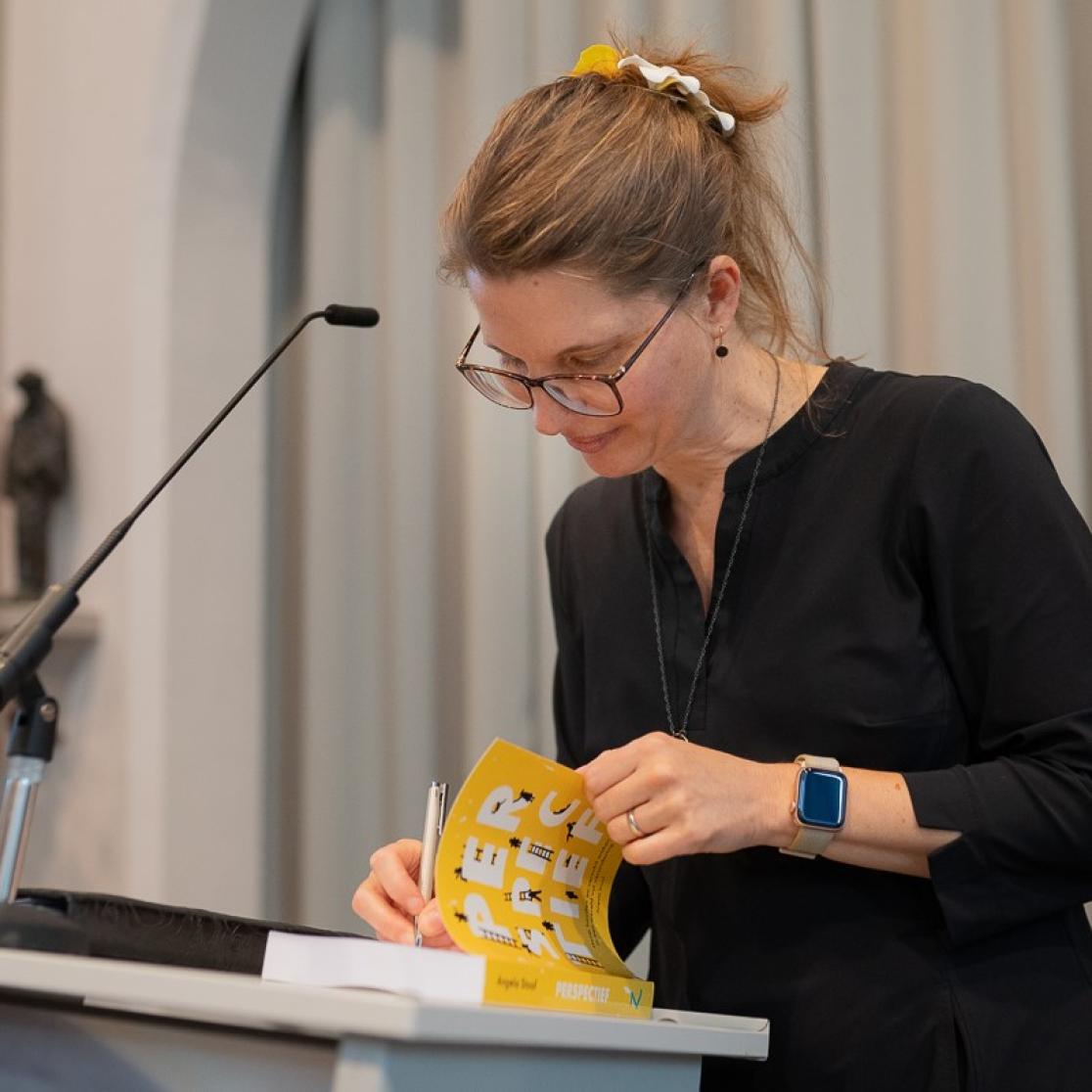
I wanted so much, but it just wouldn’t come out.
To create that space herself, she founded her current company, De Milde Organisatie, in 2018. Her mission? To bring more kindness and humanity into organisations. Her inspiration came not only from her own experiences but also from what she saw around her. “I saw so many people getting stuck in the bureaucratic clay of organisational systems. So many people full of creativity and potential, yet unable to flourish. I saw organisations becoming too hard, and the urgent need for more softness and humanity.”
Her search for answers took her deeper into the root of the issue. “I started to explore different perspectives – just like in the old PBL days. I asked: what’s really going on with systems in organisations? What kind of system is it? Why is it so persistent? And how can we make it a gentler and more humane system?”
Gradually, her perspective broadened: “I began to look beyond isolated problems. I realised that the systems putting pressure on human dignity in organisations are the same systems causing crises in healthcare, the climate, housing, and nitrogen. And then I thought: could it be that we’re facing an underlying systemic problem?” That was when she began identifying as a transition psychologist – focusing on major societal shifts and the systemic changes required in organisations and beyond.
In search of hope and perspective
Thanks to her company, Angela built a broad network and came into contact with a publisher. This led to the idea of writing a book about the systemic issue she kept encountering. She observed how this problem not only pushed people to their limits, but also affected animals and the planet. She also saw how desperately people were searching for hope and perspective.
That thought led to the title of her book: Perspectief. With this book, Angela wants to show the other side of the chaos, unrest, and confusion of our times. She interviews a wide range of people: from a Tiny House pioneer and a landscape architect to someone working on economic system change and mental health activists. “If you bring their stories together, you see there is actually so much hope and perspective. People are incredibly creative, courageous, and wise, and they’re using their uniqueness to spark entirely new beginnings. People have the capacity to start anew, again and again. The philosopher Hannah Arendt called this natality. For Arendt, this is what defines us as human. It’s a very different vision of humanity from the homo economicus, who’s always driven by self-interest. Maybe the greatest challenge of our time is learning anew what it means to be human.”
Her book is multidisciplinary, approaching questions from various angles: information theory, psychology, theology, philosophy, and more. “Being curious and practising a different way of looking at an issue is at the heart of my book,” Angela explains. “I hope to convey something of the wonder and joy that this way of seeing brings.”
I really want to bring that gentleness, kindness, and humanity back into our conversations.
Angela also hopes to foster more kindness in society. “Society sometimes feels deeply polarised, and you can see that many people are affected by that. It’s as if society is falling apart.” That’s why she emphasises the importance of listening and trying to understand one another. In her book, she introduces the concept of unblaming.
“Unblaming essentially means taking the blame you’ve placed on another off their shoulders. It means stepping out of the 'us versus them' narrative, where there’s a clear villain. Instead, you start looking at the full story: what’s the context, what were the misunderstandings, what turned out differently than intended, which rules don’t seem to work, what are the real concerns about the future?”
With Perspectief, Angela hopes to reintroduce gentleness, kindness, and humanity into conversations. “My book is truly an advocate for that.”
Further reading
Want to explore the themes of hope and perspective further? Here are Angela’s recommended reads:
- Wilding by Isabella Tree
- The Crisis of Narration and Vita Contemplativa by Byung-Chul Han
- Resonance by Hartmut Rosa
- Sacred Nature by Karen Armstrong
- The Hidden Life of Trees by Peter Wohlleben
- To Be Someone by Joep Dohmen
- Embrace the Chaos by Jan Rotmans
- The Dao of Complexity by Jean Boulton
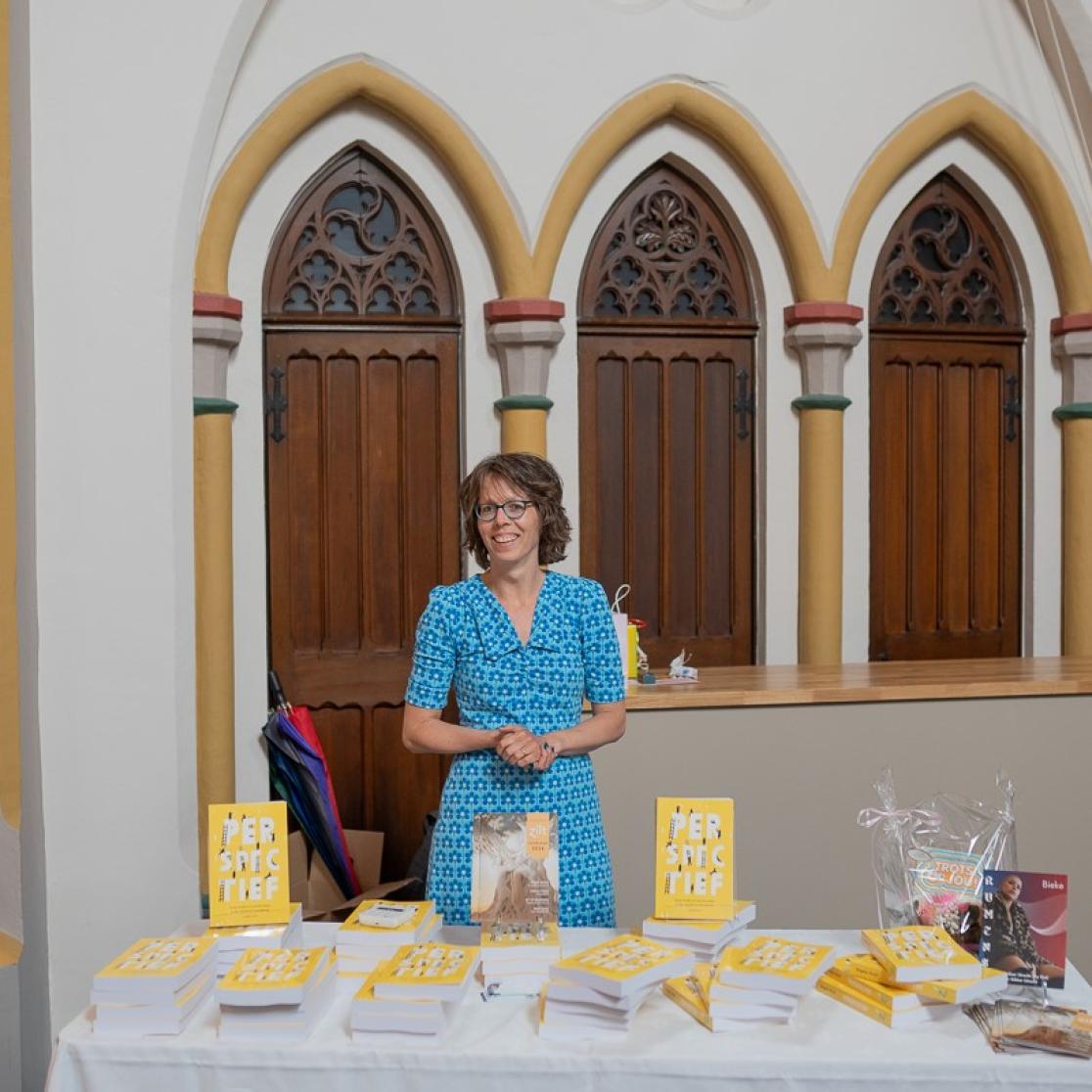
Text: Janneke Haemers
Photography: Bart van Dieken
Also read
-
Bold and innovative: The first years of Maastricht University through the eyes of Job Metsemakers
In 2024, Maastricht University welcomed its 100,000th alumna, just ahead of its 50th anniversary in 2026. Job Metsemakers, one of the university’s first students, reflects on its early years, its pioneering role in medical education, and its global influence, while celebrating the growth and lasting...
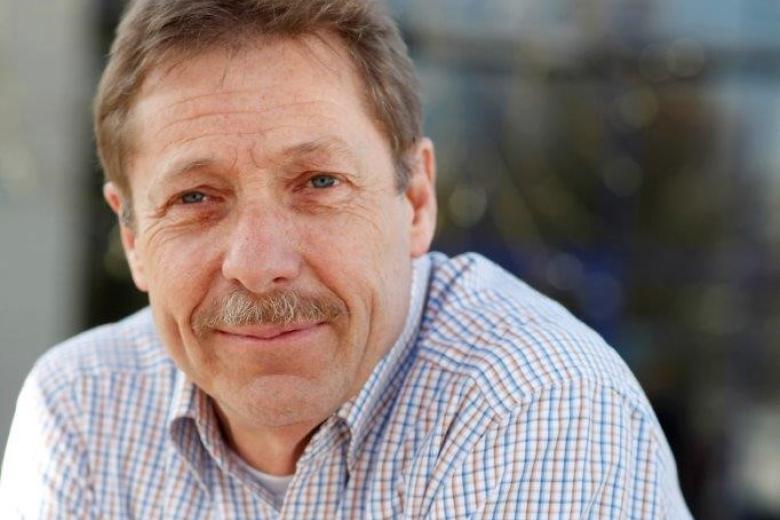
-
Discover the UM Academy for Lifelong Development platform
We’re thrilled to announce the launch of the UM Academy for Lifelong Development, a comprehensive platform that brings together the diverse educational offerings from Maastricht University’s institutes. Now, all of UM’s programmes for professionals are available in one convenient location, making it...
-
Alumna Josje Weusten: Successfully embracing creative writing
UM alumna Josje Weusten has just released her debut novel Fake Fish—a dystopian tale about fake news, AI, and the blurring of reality. Josje shares her creative journey and offers insights into the writing process, plus practical tips for aspiring authors.
